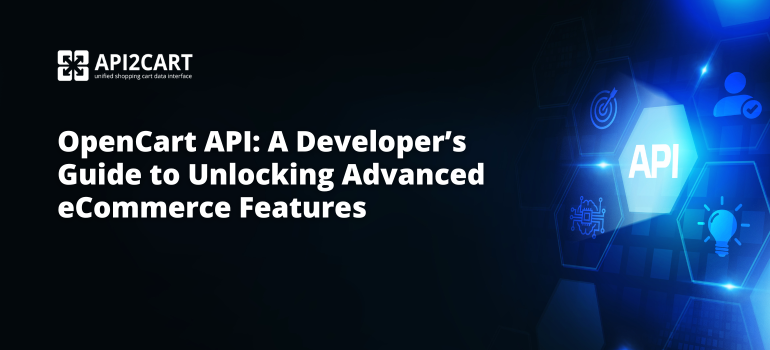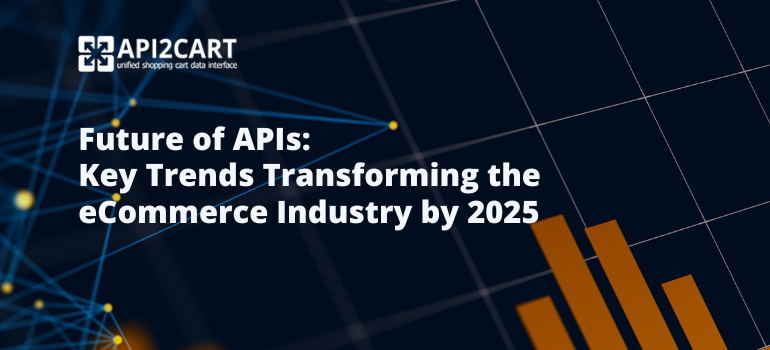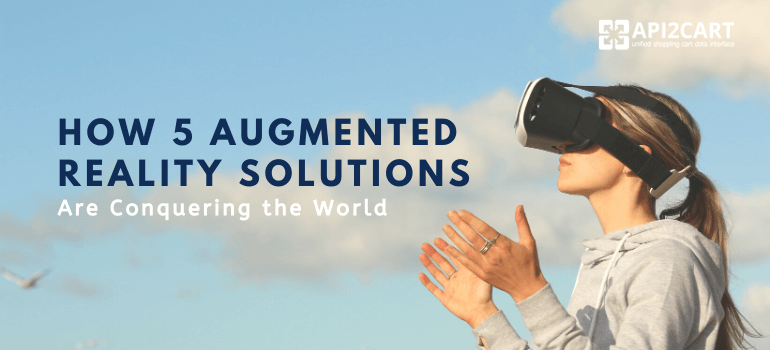
AR Impact on Shopping Experience
Basically, Augmented Reality offers a real-time direct or indirect view of consumer’s immediate surroundings changed or improved by computer-generated information such as sound, video, graphics or GPS data. With AR in eCommerce, customers can use real-life spaces and even their bodies and faces to check out if such things as furniture, clothing, etc. suit them. Thus, the major benefit of AR is that it merges two worlds, the digital and the real ones.The Evident Pros of AR
- Exhilarating Customer Experience
- Ability of Modification and Customization
- Touch-and-Feel Factor
Augmented Reality eCommerce Solutions Already Presented on the Market
Offering evident advantage, AR technology has quickly conquered the market. Moreover, it’s completely changed the way we shop. Nowadays to be noticed in this highly competitive world, there is the need for e-store changes such as using augmented reality technology. Brands like eBay, IKEA, and Alibaba have already integrated AR into their business, which let them achieve impressive results (according to the recent reports, IKEA app has been downloaded 8.5 million times). Fortunately, more and more augmented reality companies appear to enable the retailers to get their business to the next level. Let’s take a closer look at some top Augmented Reality Ecommerce Solutions available on the market.Layar
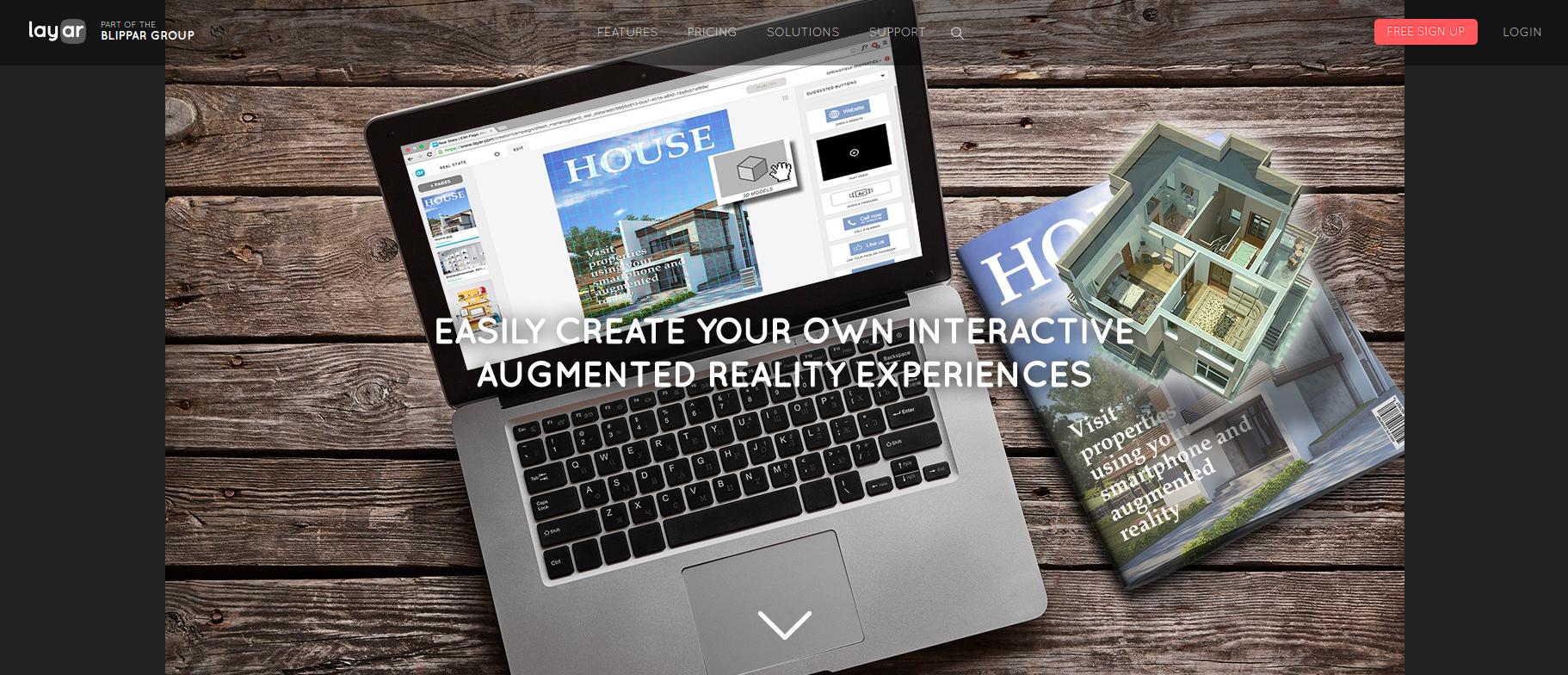 Layar was established in 2009 and quickly became the global leader in the field of Augmented Reality. Its open development platform attracts people from all over the world to create their AR content. The New York Times, The Washington Post, The National, and BBC News have written about this Augmented Reality eCommerce company, its development, achievements, and features.
Lots of worldwide brands have already used Layar to enhance their business. Here are some good customer study examples:
Layar was established in 2009 and quickly became the global leader in the field of Augmented Reality. Its open development platform attracts people from all over the world to create their AR content. The New York Times, The Washington Post, The National, and BBC News have written about this Augmented Reality eCommerce company, its development, achievements, and features.
Lots of worldwide brands have already used Layar to enhance their business. Here are some good customer study examples:
- Dutch auto club ANWB complemented with Layar to improve the pages of Kampioen (the 4th largest magazine in Europe).
- International automaker Nissan teamed Layar to launch a massive interactive print campaign across 12 Canadian newspapers.
- Canadian publisher Glacier Media implemented interactive print from Layar in 12 of its daily and weekly local newspapers.
Blippar
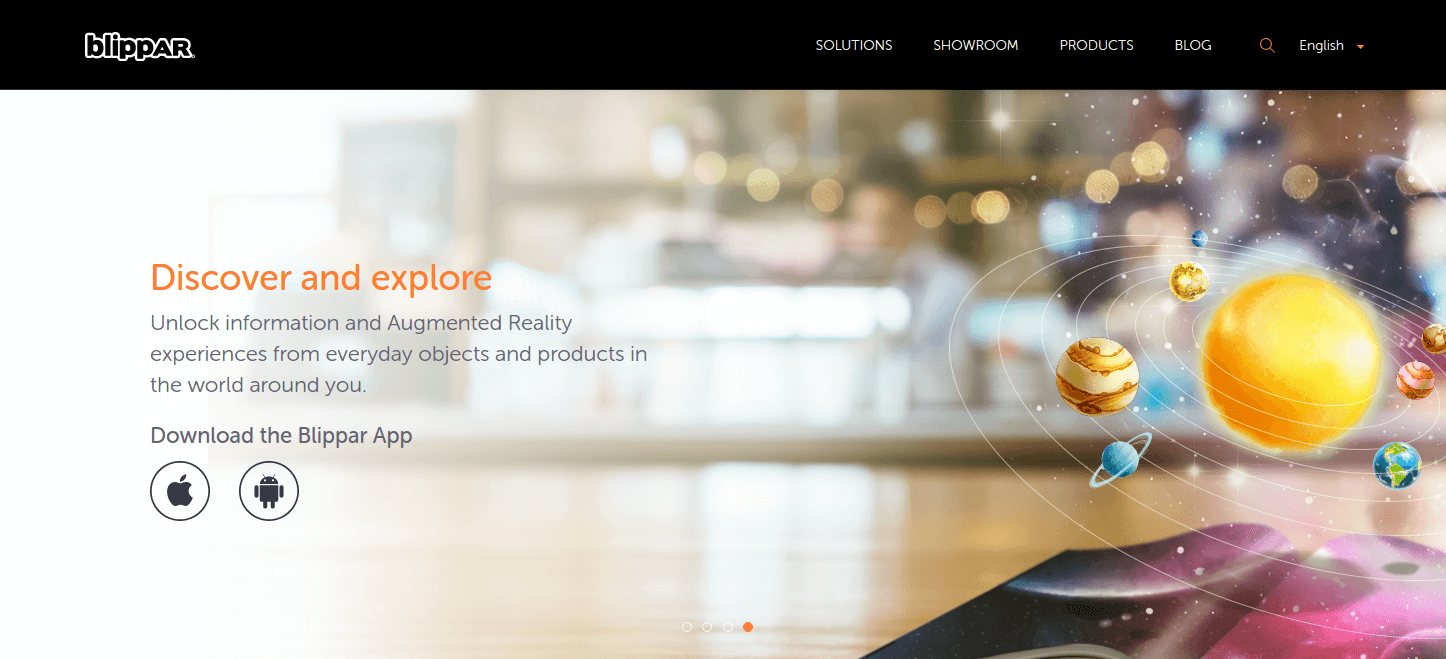 Blippar is a mobile AR and image recognition platform that provides retailers to reach their customers through outdoor ads, billboards, newspapers, etc. It unlocks digital content to bring physical objects to life. Blippar has been featured in many media sources like The Telegraph, BBC News, Business Insider, Forbes, and more.
This platform shapes the way people connect with the world. Here are some examples of its custom solutions (just download the app and watch):
Blippar is a mobile AR and image recognition platform that provides retailers to reach their customers through outdoor ads, billboards, newspapers, etc. It unlocks digital content to bring physical objects to life. Blippar has been featured in many media sources like The Telegraph, BBC News, Business Insider, Forbes, and more.
This platform shapes the way people connect with the world. Here are some examples of its custom solutions (just download the app and watch):
- Blippar and Oreo teamed up to activate an opportunity for Walmart shoppers to elect the next innovative Oreo flavor to be featured in stores in 2017.
- Shortlist Magazine brought the world of the Hobbit to its readers with a blippable cover. Blipping the cover gave users instant access to exclusive trailers and a chance to win a copy of the famous book.
- Meet the 7 farmers is the Blippar app and a bottle of Heineken. By scanning the label, consumers access Heineken's sustainability report, a story of each farmer and a "Legendary 7elfie" to share on social media.
Augment
 Augment is an enterprise AR platform established in 2011 that offers solutions across sales, marketing, design, and e-commerce. Their mission is to merge the physical and virtual experiences, which has been noted by such press outlets as ProductionHUB, PCMag, The Guardian, Entrepreneur, and others.
Augment is an enterprise AR platform established in 2011 that offers solutions across sales, marketing, design, and e-commerce. Their mission is to merge the physical and virtual experiences, which has been noted by such press outlets as ProductionHUB, PCMag, The Guardian, Entrepreneur, and others.
The company has helped businesses representing different industries. In particular, here are a couple of representative case studies:
- Captured Dimensions has expanded its core-service offers and suggestions by having used Augment’s technology. The company mixed 3D scanning and augmented reality for the music group Anamanaguchi. As a result, fans are provided with a possibility to scan the album cover with Augment to make a 3D member of the band appear.
- Turnstangen.de, a company specializing in gymnastic bars and sandboxes for kids design and sell, enhanced the online shopping experience by integrating Augment directly into the Turnstangen.de e-store. As a result, the consumers can select their favorite playground pieces on the website, and then launch Augment to visualize them in real size in their backyard.
Total Immersion
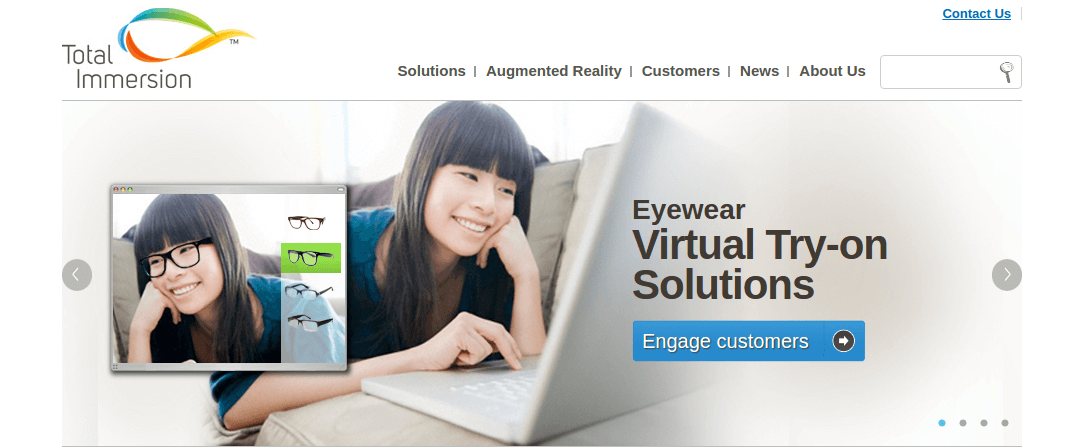 Total Immersion is a global leader in virtual try-on and augmented reality solutions for e-commerce, mobile commerce, retail, and brand marketing. Total Immersion, previously D'Fusion, enabled the fusion of reality and animation that came to be known as Augmented Reality (AR). The very first AR image produced by this company came to life in 2004. Its client list includes such brands as Toyota, Lavazza, Milka, eBay, Paramount Pictures, and lots more.
Total Immersion is a global leader in virtual try-on and augmented reality solutions for e-commerce, mobile commerce, retail, and brand marketing. Total Immersion, previously D'Fusion, enabled the fusion of reality and animation that came to be known as Augmented Reality (AR). The very first AR image produced by this company came to life in 2004. Its client list includes such brands as Toyota, Lavazza, Milka, eBay, Paramount Pictures, and lots more.
Marxent
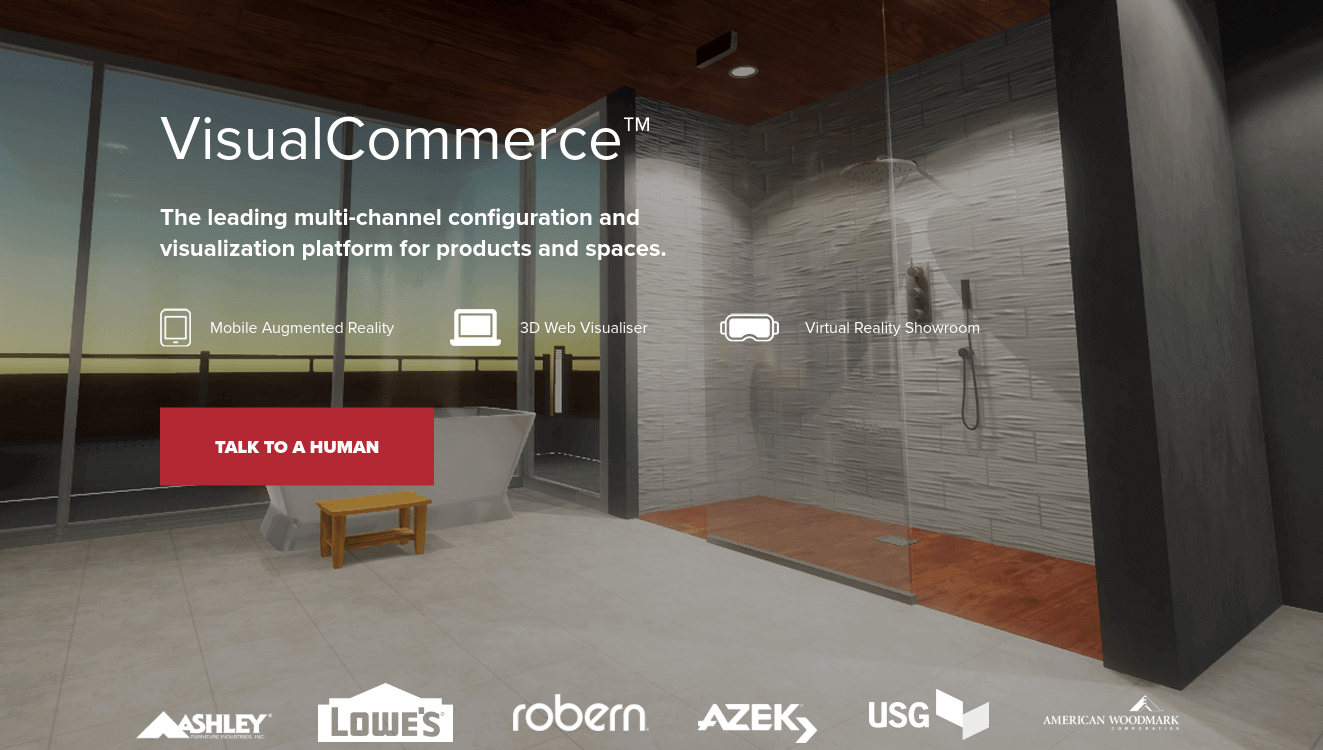 Marxent is a known leader in VR and AR product visualization for sales and marketing. The VisualCommerce™ SaaS platforms powers AR apps for leading retailers and manufacturers. In particular, it operates many 3D items, collections, and configurations, and enables brands to publish their 3D content to any AR or VR device. Just as other solutions mentioned in the article, Marxent has also been featured in many media sources like Forrester, Dayton Business Journal, and CNBC.
Marxent works with innovative companies such as ToysRUs, Simmons Bedding Company, Hammacher Schlemmer and AZEK Building Products. Here is a striking user story:
Marxent is a known leader in VR and AR product visualization for sales and marketing. The VisualCommerce™ SaaS platforms powers AR apps for leading retailers and manufacturers. In particular, it operates many 3D items, collections, and configurations, and enables brands to publish their 3D content to any AR or VR device. Just as other solutions mentioned in the article, Marxent has also been featured in many media sources like Forrester, Dayton Business Journal, and CNBC.
Marxent works with innovative companies such as ToysRUs, Simmons Bedding Company, Hammacher Schlemmer and AZEK Building Products. Here is a striking user story:
- A project of Lowe’s Home Improvement, the Loweâs Holoroom, used Marxent’s VisualCommerce™ to populate a 3D space with actual products so that its shoppers could design their perfect bathroom or kitchen and literally walk into it.

